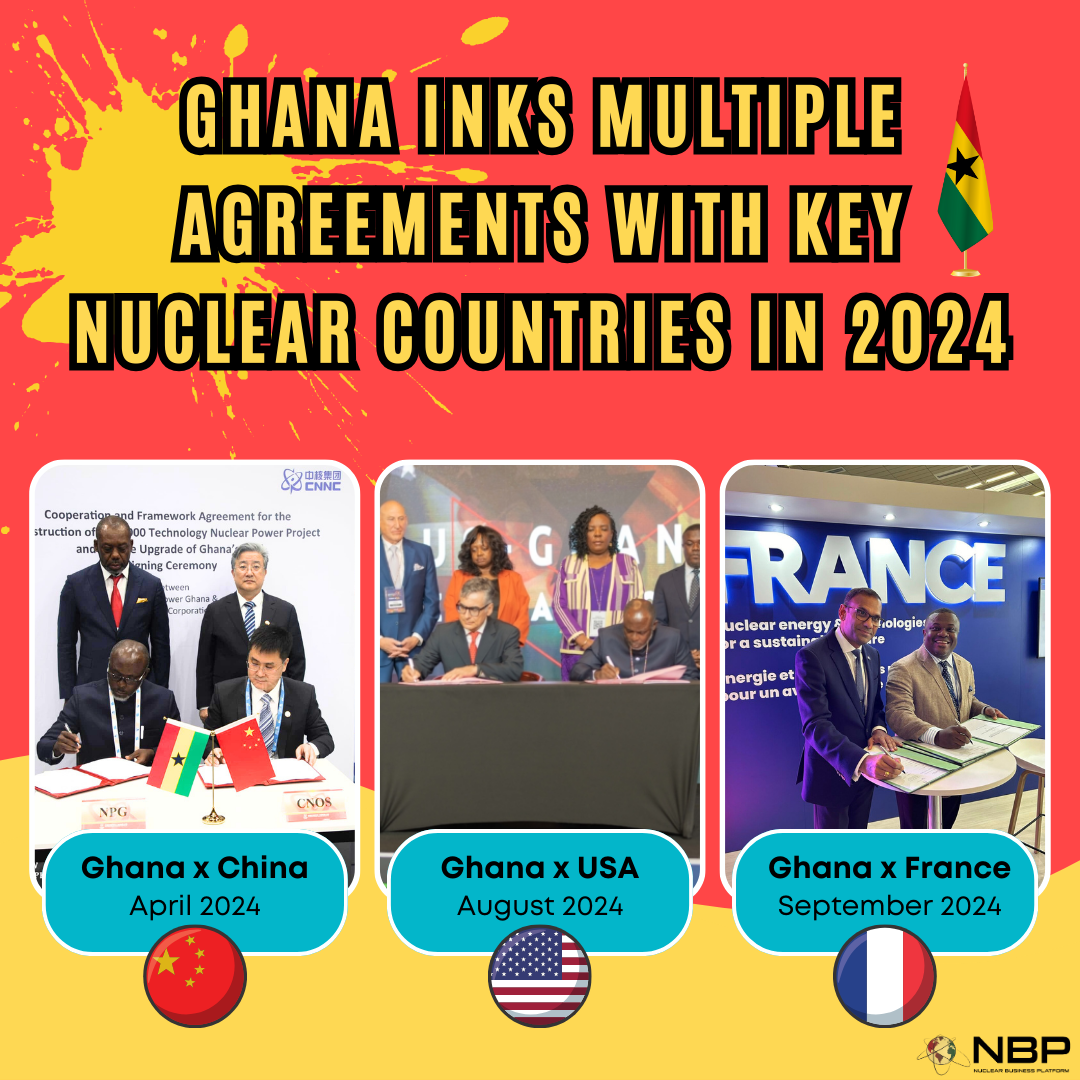Ghana Inks Multiple Agreements With Key Nuclear Countries In 2024
Throughout 2024, Ghana has been actively diversifying its partnerships within the nuclear sector by signing multiple agreements and Memorandums of Understanding (MoUs) with leading international players. This strategic approach underscores Ghana’s commitment to exploring various nuclear technologies and keeping its options open as it navigates its path toward becoming a nuclear energy producer.
In April 2024, Ghana signed a framework agreement with China National Nuclear Corporation (CNNC) to construct an HPR-1000 (Hualong One) nuclear power plant and upgrade its electrical grid.
In May 2024 at Africa Nuclear Business Platform 2024 in Accra, civil nuclear cooperation between the U.S. and Ghana reached a significant milestone. Key agreements, including the establishment of the NuScale Energy Exploration (E2) Center at the Ghana Atomic Energy Commission (GAEC).The E2 Center, the first of its kind in Africa, will serve as a pivotal training hub for future nuclear operators and engineers, cementing Ghana’s role as a regional hub for Small Modular Reactor (SMR) technology. Additionally, a Memorandum of Understanding (MoU) with the International Science and Technology Center (ISTC) to establish a Regional Welding Certification Program highlights efforts to secure a skilled workforce for the SMR supply chain.
Later in August, the Government of Ghana, through Nuclear Power Ghana, and U.S. nuclear technology project developer Regnum Technology Group reached an agreement to deploy a single NuScale VOYGR-12 small modular reactor plant in Ghana to deliver clean, reliable electricity. The two companies plan to form a subsidiary company in the near future to own and operate Africa’s first commercial advanced light-water small modular reactor plant. Ghana’s diverse partnerships also extend to other global nuclear leaders.
More recently in September on the sidelines of the IAEA General Conference, Ghana entered into an MoU with EDF of France to explore opportunities for nuclear collaboration, with a focus on capacity building and the potential deployment of the EPR1200 technology.
Ghana is making significant progress toward incorporating nuclear energy into its energy mix, motivated by its commitment to sustainable development, energy security, and combating climate change while enjoying bipartisan support. Central to this effort is the Ghana Nuclear Power Agenda, developed in collaboration with the Ghana Atomic Energy Commission (GAEC), which outlines the nation's roadmap for the construction of its first nuclear power plant. The government's plan to commission a 1,000 MW Nuclear Power Plant (NPP) by the early 2030s signals a bold step toward providing clean, reliable energy.
Ghana is currently in Phase 2 of the International Atomic Energy Agency’s (IAEA) milestone approach for nuclear power development, which involves setting up the institutional framework necessary for launching and maintaining a nuclear program. The establishment of key organizations—Nuclear Power Ghana (NPG), GAEC (including Nuclear Power Institute), and the Nuclear Regulatory Authority (NRA)—is critical to the successful rollout of the program. These bodies are tasked with overseeing the development and safe operation of the country’s first nuclear project, conducting essential research, and ensuring strict adherence to international regulatory standards. The site selection is going well as of now NPG has identified Nsuban in the Western Region as the preferred site, with Obotan in the Central Region designated as the backup option (Site Acquisition processes ongoing).


